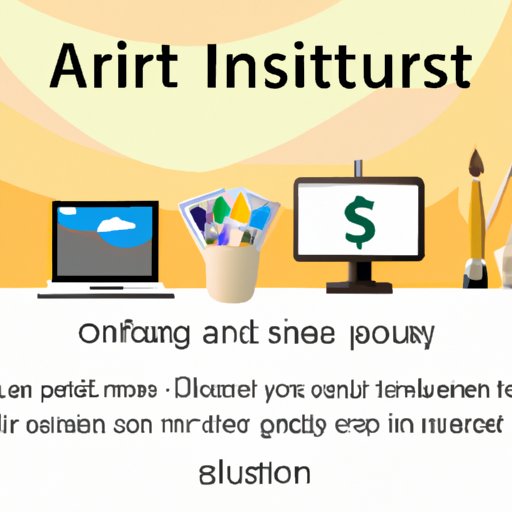Introduction
Starting an art business can be an exciting and rewarding venture. It’s a great way to share your artistic talent with the world and make a living doing what you love. But it’s also a complex undertaking that requires a lot of planning and preparation. This article will provide an in-depth look at how to start a small art business online.
Definition of “Starting an Art Business”
When we talk about starting an art business, we’re referring to the process of selling artworks or services related to art. This could include selling original paintings, prints, sculptures, digital artwork, or offering art classes and workshops. It may also involve creating custom designs for clients or producing merchandise such as t-shirts or mugs.
Purpose of the Article
This article provides a comprehensive overview of the steps involved in starting a small art business online. It outlines the key considerations and practical steps that should be taken when setting up an art business, such as researching the market, developing a brand, creating an online presence, acquiring tools and materials, establishing a pricing structure, and networking with customers.
Research the Market
Before starting an art business, it’s important to do your research. You need to understand the current trends in the art market and identify the specific niche that you want to target. This will help you determine the type of art you should create and the best way to market it.
Understand Current Trends in Art
One of the first steps to starting an art business is to stay on top of current trends in the art world. Keeping abreast of the latest developments will help you understand what styles and mediums are popular and which ones might be falling out of favor. You can stay up to date by following art blogs, reading industry magazines, and attending art fairs and exhibitions.
Leverage Trends to Your Advantage
Once you have a good understanding of the current trends in the art market, you can use this knowledge to your advantage. For example, if you know that abstract art is particularly popular right now, you could focus on creating abstract pieces or offering abstract art classes. This will help ensure that you’re targeting the right audience and maximizing your potential sales.
Develop Your Brand
Creating a strong brand identity is essential for any successful art business. A good brand will help you stand out from the competition and make your artwork more recognizable. It will also help establish trust with customers and attract new buyers.
Find a Unique Niche
Finding a unique niche is one of the most important steps to developing your brand. Identifying a specific area of focus will help differentiate your art from other artists and give you a competitive edge. Think about your own artistic style and interests and try to find a niche that aligns with them.

Create a Strong Brand Identity
Once you’ve identified your niche, it’s time to create a strong brand identity. This includes choosing a logo, color palette, and tagline that represent your brand. You should also create a website and social media accounts to promote your artwork and engage with customers.
Create an Online Presence
Having an online presence is essential for any small art business. It’s a great way to showcase your work, reach potential customers, and build relationships with your followers. Here are some tips for creating an effective online presence:
Utilize Social Media Platforms
Social media is a powerful tool for promoting your art business. It’s a great way to connect with potential customers and share your work with a wider audience. Make sure to post regularly and engage with your followers to build relationships.

Utilize Blogs and Other Online Platforms
In addition to social media, there are many other online platforms that can help you promote your art business. Blogging is a great way to share your thoughts and insights on art, while online galleries and portfolios can help you show off your work. You should also consider joining online art communities and forums to network with other artists and potential customers.
Acquire Tools and Materials
Once you’ve established your online presence, it’s time to acquire the necessary tools and materials for creating your art. This will depend on the type of artwork you’ll be producing and the mediums you’ll be using. You may need to invest in professional equipment and supplies, such as paints, brushes, canvases, and printing equipment.
Establish Pricing Structure
The next step is to establish a pricing structure for your art business. You’ll need to decide how much to charge for your artwork and services. Consider the cost of materials and labor, as well as market conditions, to determine pricing that will make your art business profitable.

Network and Connect with Customers
Finally, it’s important to network with potential customers and build relationships. You can do this by attending art events, connecting with other artists, and reaching out to galleries and other businesses that may be interested in your artwork. You should also take advantage of online marketing tools such as email campaigns and advertising.
Conclusion
Starting a small art business online can be a rewarding experience. By following the steps outlined in this article, you can set up a successful business and make a living doing what you love. Researching the market, developing a brand, creating an online presence, acquiring tools and materials, establishing a pricing structure, and networking with customers are all essential steps to starting a small art business online.
(Note: Is this article not meeting your expectations? Do you have knowledge or insights to share? Unlock new opportunities and expand your reach by joining our authors team. Click Registration to join us and share your expertise with our readers.)
